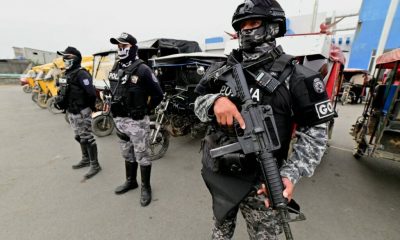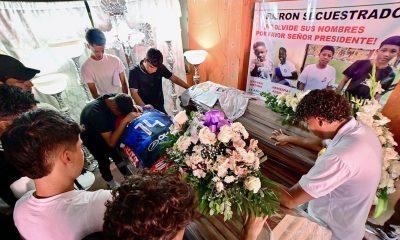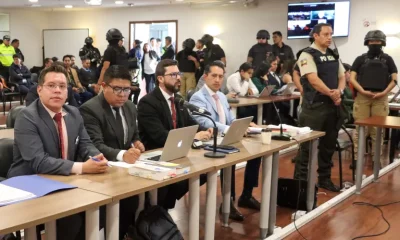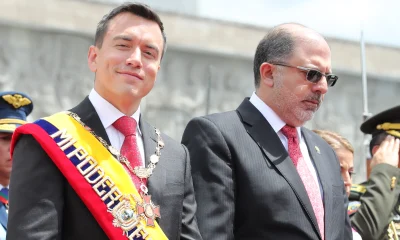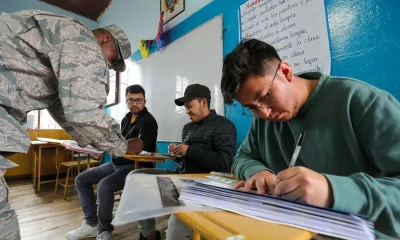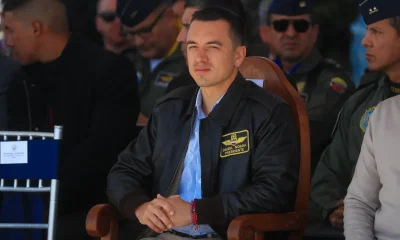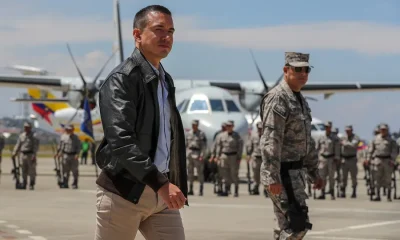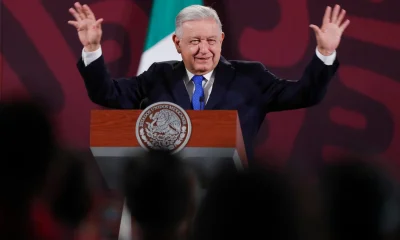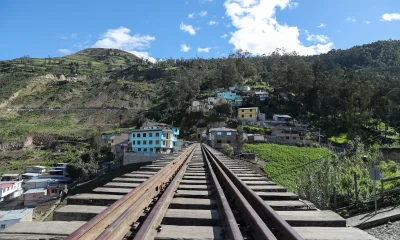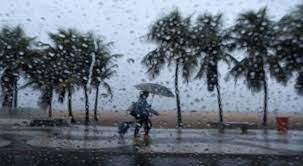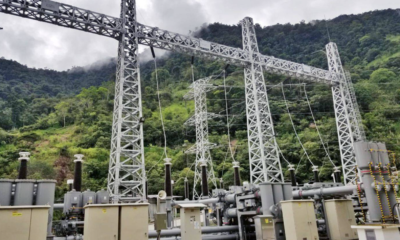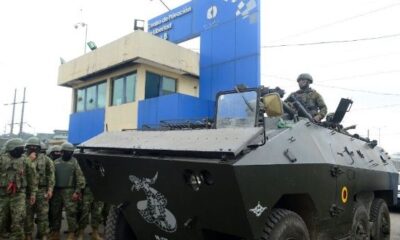International
Noboa decrees a new state of emergency in Ecuador due to the serious energy crisis
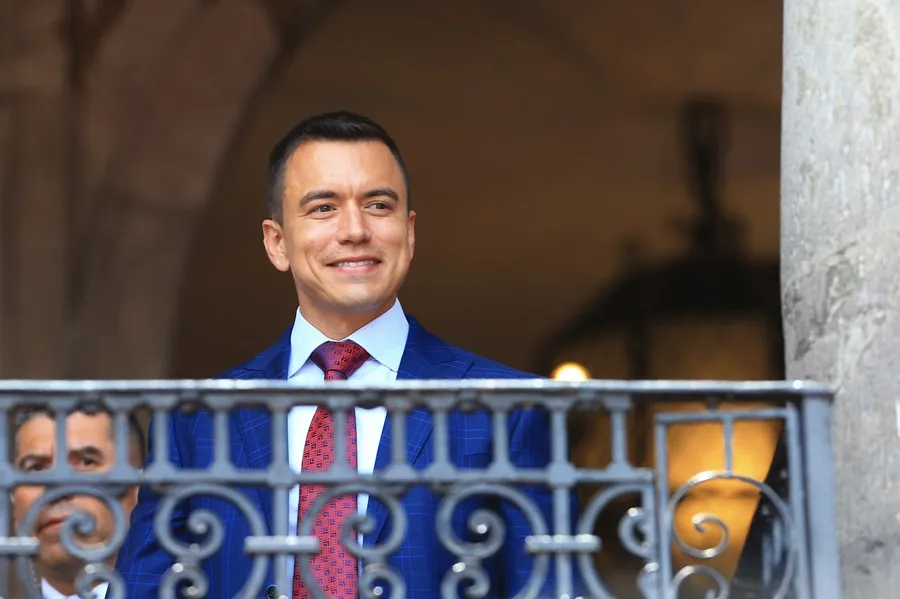
The president of Ecuador, Daniel Noboa, again decreed a new state of emergency at the national level for 60 days, this time because of the serious energy crisis that the country is going through, with blackouts of up to eight hours during to not being able to meet the national demand for electricity.
Through a decree, Noboa ordered “the mobilization and intervention of the National Police and the Armed Forces throughout the national territory, duly coordinated, to guarantee the security of critical energy infrastructure facilities to prevent sabotage, terrorist attacks or other threats that may affect their operation.”
Since last Sunday Ecuador has suffered daily blackouts in different areas of up to eight hours of duration, since the Mazar reservoir, the second largest in the country, has been left without the sufficient water level, which allows the operation of a complex of three hydroelectric plants with a power of 1,757 megawatts, equivalent to about a third of national demand.
Added to this is the cut in the supply of electricity from Colombia, which also faces a situation of great drought that does not allow it to generate surplus electricity to export to Ecuador.
This new state of emergency occurs on the eve of the referendum called by Noboa for this Sunday where it seeks to carry out with popular support a series of reforms in the field of security, justice, investments and employment.
It also arrives less than three weeks after the previous state of emergency ended, issued at the beginning of January to address the swell of violence of organized crime gangs, after a series of attacks and violent actions that included the taking of the TC Television channel by a group of armed men during a live broadcast.
The previous state of emergency was accompanied by the declaration of ‘internal armed conflict’, the same that remains until now and that serves the Ecuadorian Government to consider twenty-two criminal gangs as terrorist groups and non-state belligerent actors that can be neutralized by the Armed Forces.
Thus, in the week of the referendum, the blackouts returned to Ecuador, a situation that Ecuadorians had already experienced at the end of last year due to another similar situation of drought in the main hydroelectric plants and a fall in Colombia’s supply.
On that occasion the power cuts were up to four hours, half that at the current time that Noboa attributed to an alleged sabotage, to the point that his administration filed a complaint against twenty-two people for allegedly hiding information and not giving the voice of alert in advance.
Among the people who are part of the presidential accusation is the former Minister of Energy and Mines Andrea Arrobo, to whom Noboa asked for her resignation in a public event on Tuesday, after last Friday she had ruled out the return of blackouts to Ecuador in the short term.
Even the Secretary of Communication of the Presidency, Roberto Izurieta, went so far as to affirm on Thursday that they have suspicions that the Mazar reservoir was deliberately emptied, something that was denied by the Corporación Eléctrica del Ecuador (Celec), which operates the reservoir.
According to the data of this company, the level of the reservoir, located in the southern Andean province of Azuay, whose capital is Cuenca, has been gradually decreasing since the beginning of this year, and apparently it has not rained enough in that time for it to be replenished.
The prolonged power cuts forced the Government to decree for this Thursday and Friday the suspension of the working day and school classes, although many private businesses continued to operate normally, since in Ecuador only three out of ten people of working age have a formal job.
International
U.S. Senate Rejects Budget, Bringing Government Closer to Shutdown Amid DHS Dispute

The U.S. Senate voted on Thursday against a budget proposal in a move aimed at pressuring changes at the Department of Homeland Security (DHS), following the killing of two civilians during a deployment of immigration agents in Minneapolis.
All Senate Democrats and seven Republican lawmakers voted against the bill, which requires 60 votes to advance, pushing the country closer to a partial government shutdown that would cut funding for several agencies, including the Pentagon and the Department of Health.
The rejection came as Senate leaders and the White House continue negotiations on a separate funding package for DHS that would allow reforms to the agency. Proposed measures include banning Immigration and Customs Enforcement (ICE) agents from wearing face coverings and requiring them to use body-worn cameras during operations.
The vote took place just hours after President Donald Trump said he was “close” to reaching an agreement with Democrats and did not believe the federal government would face another shutdown, following last year’s record stoppage.
“I don’t think the Democrats want a shutdown either, so we’ll work in a bipartisan way to avoid it. Hopefully, there will be no government shutdown. We’re working on that right now,” Trump said during a Cabinet meeting at the White House.
International
Trump Says Putin Agreed to One-Week Halt in Attacks on Ukraine Amid Extreme Cold

U.S. President Donald Trump said on Thursday that he secured a commitment from Russian President Vladimir Putinto halt attacks against Ukraine for one week, citing extreme weather conditions affecting the region.
“Because of the extreme cold (…) I personally asked Putin not to attack Kyiv or other cities and towns for a week. And he agreed. He was very pleasant,” Trump said during a Cabinet meeting broadcast by the White House.
Trump acknowledged that several advisers had questioned the decision to make the call.
“A lot of people told me not to waste the call because they wouldn’t agree. And he accepted. And we’re very happy they did, because they don’t need missiles hitting their towns and cities,” the president said.
According to Trump, Ukrainian authorities reacted with surprise to the announcement but welcomed the possibility of a temporary ceasefire.
“It’s extraordinarily cold, record cold (…) They say they’ve never experienced cold like this,” he added.
Ukrainian President Volodymyr Zelensky later commented on the announcement, expressing hope that the agreement would be honored.
International
Storm Kristin Kills Five in Portugal, Leaves Nearly 500,000 Without Power

Storm Kristin, which battered Portugal with heavy rain and strong winds early Wednesday, has left at least five people dead, while nearly half a million residents remained without electricity as of Thursday, according to updated figures from authorities.
The revised death toll was confirmed to AFP by a spokesperson for the National Emergency and Civil Protection Authority (ANPEC). On Wednesday, the agency had reported four fatalities.
Meanwhile, E-Redes, the country’s electricity distribution network operator, said that around 450,000 customers were still without power, particularly in central Portugal.
Emergency services responded to approximately 1,500 incidents between midnight and 8:00 a.m. local time on Wednesday, as the storm caused widespread disruptions.
The Portuguese government described Kristin as an “extreme weather event” that inflicted significant damage across several regions of the country. At the height of the storm, as many as 850,000 households and institutions lost electricity during the early hours of Wednesday.
Several municipalities ordered the closure of schools, many of which remained shut on Thursday due to ongoing adverse conditions.
Ricardo Costa, regional deputy commander of the Leiria Fire Brigade, said residents continue to seek assistance as rainfall persists.
“Even though the rain is not extremely intense, it is causing extensive damage to homes,” he noted.
In Figueira da Foz, a coastal city in central Portugal, strong winds toppled a giant Ferris wheel, underscoring the severity of the storm.
-

 Central America3 days ago
Central America3 days agoGuatemala seizes over a ton of cocaine hidden in flour at Pacific port
-

 International4 days ago
International4 days agoDelcy Rodríguez seeks political agreements after Maduro’s ouster
-

 International3 days ago
International3 days agoHistoric snowstorm paralyzes Toronto after 60 centimeters of snow
-

 International3 days ago
International3 days agoSpain’s irregular migrant population rises to 840,000, study finds
-

 Central America2 days ago
Central America2 days agoGuatemala Police Arrest Prison Guard Caught in the Act of Extortion
-

 Central America2 days ago
Central America2 days agoHonduras swears in conservative president Asfura after disputed election
-

 International4 days ago
International4 days agoFederal immigration agents kill man in Minneapolis, sparking protests and outrage
-

 International1 day ago
International1 day agoFootball Fan Killed in Clashes After Colombian League Match
-

 Central America2 days ago
Central America2 days agoBukele leads public trust rankings as UCA survey highlights gains in security
-

 International2 days ago
International2 days agoWinter Storm Fern Leaves 30 Dead and Over One Million Without Power Across the U.S.
-

 International2 days ago
International2 days agoDoomsday clock moves to 85 seconds before midnight amid rising global risks
-

 Sin categoría2 days ago
Sin categoría2 days agoEight Killed in Series of Armed Attacks in Ecuador’s Manabí Province
-

 International3 days ago
International3 days agoRights group says nearly 6,000 killed in Iran protest crackdown
-

 International1 day ago
International1 day agoMissing Spanish Sailor Rescued After 11 Days Adrift in Mediterranean
-

 International1 day ago
International1 day agoRubio Says U.S. Could Participate in Follow-Up Russia-Ukraine Talks
-

 Central America1 day ago
Central America1 day agoGuatemala President Says Starlink Terminal Found Inside Prison
-

 International2 days ago
International2 days agoSpain approves plan to regularize up to 500,000 migrants in Historic Shift
-

 Sin categoría2 days ago
Sin categoría2 days agoEl Salvador Launches Fourth Year of Ocean Mission to Protect Marine Ecosystems
-

 International3 days ago
International3 days agoVenezuela frees at least 80 political prisoners, NGO says
-

 International3 days ago
International3 days agoEU launches new probe into X over AI-generated fake nude images
-

 International3 days ago
International3 days agoSevere winter storm grips U.S., leaves multiple dead as extreme cold persists
-

 International3 days ago
International3 days agoFrance debates ban on social media for children under 15
-

 International2 hours ago
International2 hours agoMan Arrested After Vehicle Crashes Into Jewish Institution in Brooklyn
-

 International2 hours ago
International2 hours agoU.S. Senate Rejects Budget, Bringing Government Closer to Shutdown Amid DHS Dispute
-

 International2 hours ago
International2 hours agoStorm Kristin Kills Five in Portugal, Leaves Nearly 500,000 Without Power
-

 International2 hours ago
International2 hours agoTrump Says Putin Agreed to One-Week Halt in Attacks on Ukraine Amid Extreme Cold



























